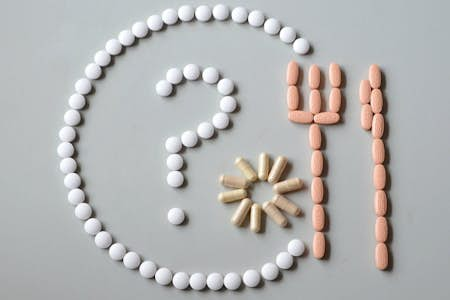Heroin is part of a group of drugs known as ‘opiates', meaning it comes from opium (the term which refers to the dried sap of the opium poppy). While it is unclear precisely when opium was first used recreationally and as an analgesic (painkiller), scholars are sure it has been around for several centuries.
Although opiates have been used as painkillers for thousands of years, the inception of morphine as we know it occurred in 1803 when German scientist Fredrich Sertürner first isolated morphine from opium. A potent painkiller, morphine is the active narcotic ingredient in opium and, in its purest form, much stronger than opium itself.
While it remains a painkiller in everyday practice to this day, morphine proved to be a highly addictive drug. As a result, scientists sought a less addictive and safer form of morphine for their patients. In 1874, British scientist Alder Wright first synthesised heroin for medical use. Pharmaceutical company Bayer marketed its commercial preparation of the drug soon after, produced by boiling morphine for several hours.
Doctors used heroin to treat various ailments, including coughs and asthma, for several decades in the late 1800s and early 1900s, as it was initially thought to be non-addicting.
However, it was soon discovered that heroin was just as addictive as morphine, and heroin addiction rates soared throughout America and Western Europe during this period. The powerfully addicting properties of heroin were soon acknowledged, and opium and heroin were prohibited in the early 20th century.
Heroin in the UK today
Despite laws banning heroin, opiate addiction and heroin addiction present significant public health issues today.
GOV.UK statistics show that of all people undergoing treatment for drug abuse in 2020 and 2021, over half were there for opiate addiction issues (around 141,000 people).
During this same period, 3,726 deaths in drug treatment were recorded. Around two-thirds of these deaths (65%) were in people with opiate problems.
And we’re yet to mention the significant social and economic costs relating to drug use in the UK, 86% of which are attributable to illicit opiate use and crack cocaine in England. The average economic cost per user of illegal opiates and crack cocaine is over 50 times greater than other drug users.
Heroin addiction in over-50s
While it is difficult to ascertain the exact numbers of drug or heroin users and their demographics, we may look to data on treatment numbers for general trends.
Data from the Office for Health Improvement and Disparities showed a slight increase in opiate users in treatment from 2020 to 2021 and an increase in older age groups entering treatment for opiate addiction.
More than half of the people in treatment (56%) were over 40 years old (compared to 55% from 2019 to 2020 and 51% from 2016 to 2017, respectively). Furthermore, drug misuse and drug-related deaths were highest among people born in the 1970s, putting people in the over-50 category at the most significant risk. Meanwhile, less than 7% of people in treatment for opiates were under 30.
There are several risk factors for substance use disorders in older adults, including:
- Social isolation
- Chronic pain or illness
- Physical disability
- Reduced mobility
- Taking lots of medications
- Previous substance abuse
- Poor mental health (prior or current)
It is also thought some older adults may abuse substances to cope with significant changes in circumstances brought on by ageing, such as declining health, retirement, grief, loss, or a change in living situation.
Older adults also tend to metabolise substances more slowly, and their brains can be more sensitive to drugs.
Effects of heroin: Why is heroin so addictive?
Heroin affects the opioid receptors in the brain. As a strong sedative, the use of heroin makes the drug user feel relaxed and peaceful. If entered into the bloodstream quickly (through injecting, for example), heroin produces extremely pleasurable feelings of euphoria and relaxation for the individual taking it, which are highly addictive.
Heroin is more addictive than morphine because its chemical modification means it crosses the blood-brain barrier more quickly than morphine, thus creating the 'rush' heroin users feel.
Repeated use of heroin generally causes heroin addiction and physical dependence, thus causing the heroin user to experience withdrawal symptoms if they do not take heroin.
How is heroin taken?
Three common ways that heroin users ingest the drug are:
- Inhalation: often referred to as ‘chasing the dragon’, the heroin is heated on a surface of tin foil and smoked
- Snorting: either a purified powder of heroin is snorted, or if it is not pure, the drug is liquefied and snorted through a syringe
- Injecting: heroin is dissolved in water and injected into the bloodstream via needle and syringe
No matter the method of heroin use, heroin is a highly addictive substance with high potential for overdose death. It can also cause irreparable damage to the body and brain.
Health risks of using heroin
As with any form of substance abuse, heroin abuse carries significant health risks. Furthermore, heroin kills more people than any other illicit drug in the UK, making the risks of using heroin particularly serious.
First and foremost is the risk of overdose. It is relatively easy for a heroin addict to overdose. This often happens following a period of not taking heroin for a few days, thus reducing tolerance. This means that the same dose that the user was able to tolerate previously is now too high for them. The drug user is more at risk if they inject heroin than if they take heroin other ways.
Common signs of heroin overdose include:
- Shallow breathing
- Reduced heart rate
- Bluish tint to mouth and fingertips
- Drop in blood pressure
- Pinpoint pupils
- Muscle cramps
- Unconsciousness
- Tremors/spasms
A heroin overdose is a serious medical emergency – seek help immediately if you suspect you or someone else is experiencing a heroin overdose.
There are other health risks. Heroin use also often involves sharing syringes and needles, rendering those who do so vulnerable to HIV, hepatitis B and hepatitis C, among other conditions. Using needles also leaves the heroin user susceptible to infections and gangrene.
Vomiting and nausea are common among heroin users, particularly after their first use. Those using heroin are, therefore, at risk of dying from choking on inhaled vomit.
Older people with heroin problems may have higher rates of circulatory and respiratory problems, diabetes, degenerative disorders and liver cirrhosis than younger people who use the same drugs. It is also thought they may be at greater risk for infection, overdose and suicide.
Symptoms of heroin addiction
Heroin addiction manifests as a host of physical, psychological and behavioural symptoms.
Physical symptoms
- Overwhelming cravings
- Increased tolerance to heroin
- Malnutrition
- Drowsiness/exhaustion
- Respiratory issues
- Seizures
- Blood clots
- Gastrointestinal problems
- Absence of menstrual cycle in women
- Withdrawal symptoms (see next section)
Psychological symptoms
- Mental health issues such as anxiety and depression, as well as suicidal thoughts and impulses
- Loss of ability to concentrate or focus
- Mood swings
- Angry outbursts
- Disorientation
- Poor judgement
Behavioural symptoms
- Withdrawing from family members and friends
- Poor performance or attendance in school or work
- Reduced interest in hobbies and pastimes that once interested the drug user
- Evidence of drug paraphernalia, including spoons, needles, syringes and foil wrappers with burn marks, amongst others
- Financial or legal problems
- Reduced interest in personal hygiene or grooming
Heroin withdrawal
Heroin withdrawal is distressing and uncomfortable for the heroin addict. The onset of withdrawal symptoms typically occurs around 8-24 hours after the drug user's most recent use and can be expected to persist for 4-10 days.
Heroin withdrawal symptoms include, but are not limited to:
- Muscle cramping
- Stomach issues such as diarrhoea, nausea, and vomiting
- Difficulty sleeping (insomnia)
- Anxiety
- Flu-like symptoms, including sweating and hot and cold flushes
Heroin addiction treatment
Overcoming heroin addiction may seem challenging or daunting for the drug user. Still, recovery is possible, and today there are various interventions and treatment options available depending on the patient's needs.
Upon starting treatment, the drug user will be assigned a key worker who will assist in drafting a personalised treatment plan and will be in regular contact throughout treatment.
Treatments for heroin addiction include the below options.
Maintenance versus detoxification (detox)
There are two different approaches to curtailing heroin addiction, both requiring medical supervision.
Maintenance therapy involves replacing heroin with a heroin substitute (commonly methadone or buprenorphine). The patient will stay on a stable dose of the heroin substitute.
Alternatively, in detoxification, the patient will do the above but gradually withdraw from the substitute until they are using neither.
Both treatments can usually happen while the patient lives at home and are designed for the user to withdraw from the drug gradually and help with withdrawal symptoms and cravings.
Rehabilitation / Inpatient detoxification
There are several reasons why heroin-addicted individuals may require inpatient rehabilitation, including:
- They need support with other physical or mental health issues
- They are detoxing from another drug as well as heroin
- Community detox has not been successful in the past
Additional support
Support for patients giving up heroin may include talking therapies (such as cognitive behavioural therapy [CBT]), support groups, incentives, and help to stay healthy.
Key workers will typically continue working with a patient for six months following heroin detoxification.
It’s never too late to seek treatment for heroin addiction
Drug addiction can often feel insurmountable and isolating, but those needing help with substance addiction are as entitled to healthcare as anyone with any other health condition.
If you have concerns about heroin addiction for yourself or a loved one, seek help by contacting your GP or local drug treatment service. They will be able to advise you on the best course of treatment and also refer you to several helpful organisations.
In the case of older heroin users seeking treatment, the same advice applies. While little is known about the best models of care specifically for older patients suffering from heroin addiction, research is emerging that shows longer durations of care, with emphasis on rebuilding support networks, may be beneficial.
It is never too late to seek transformative and life-saving treatment; help is on hand for those in need. You can learn more about what to expect from heroin addiction treatment by visiting the NHS website.









